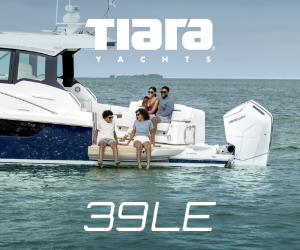Self-driving boats are here, but does the recreational market need it—or even want it?
It’s happening with cars, and now Sea Machines in Boston is developing the technology for autonomous, self-driving boats that can do the real dirty work on the water. Sea Machines’ sea trials in the summer of 2017 showed that these pilot-free boats will one day snuff out oil fires, track criminals through dark harbors and transport cargo through heaving, empty seas, all without human beings at the helm. Robot world is a reality.
While autonomous vessels may succeed in the commercial and military market, the recreational boating field seems far less likely to embrace self-driving boats. What many people love about boating is the feel of the steering wheel and power of the engines or sails. Take that away, and you might as well be on a ferry boat.
“While technology certainly makes navigating an easier task, there is no substitute for a vigilant watchkeeper and regular engine room checks,” says Roger Sowerbutts of Horizon Yacht USA. “As a more traditional ‘paper chart’ operator, I would have to be far more convinced than I am now about the reliability of the systems and the ability to overcome issues like a lost engine, hydraulic failure and internal power surges before I would consider it the norm.
”Sea Machines’ Autonomous Control System for commercial boats uses onboard instruments—such as digital GPS, 4G radar, AIS, sonar, and night vision—and proprietary algorithms so that the boat itself can avoid obstacles or collision with another vessel. The system integrates propulsion, steering, and thrusters with instruments and sensors, while remote control is provided for command and control as well as data reception from the autonomous vessel. Sea Machines’ tagline suggest the company’s product brings value to “things that are dangerous, dirty and dull.”
While that’s an apt description of firefighting or a 6,000-mile commercial cargo haul, it’s not applicable to what Southern Boating readers and boating enthusiasts desire. “One of the reasons that people go boating is that they learn the joys of being one with the wind and waves,” says Bob Johnstone, founder and CEO of MJM Yachts. “It’s not quite as utilitarian a job as driving a car. Our mantra now at MJM is the luxury of effortless driving. It’s just so much fun. All our boats have the same 24-inch destroyer wheel—nice varnished teak to hold on to. If you can’t enjoy driving the boat, why would you own it?”
Comparing the rapid development of self-driving cars by companies like Google and Tesla to the recreational marine market may not be possible, according to David Marlow, founder and CEO of Marlow Marine. “On balance, while the ability to describe a safe course for the automobile is less complex, the inputs of danger to the auto and people are also constantly varying in degree and scope,” Marlow asserts. “The response rate for the yacht would be less rapid and more variable, posing significantly higher hurdles that would require instant recognition of a sudden athwartships tidal stream, wind gust, etc., as an example in a narrow canal or passage over a narrow opening. Control mechanisms in a yacht generally are much slower to respond fully to variations in course, and…for some vessels, a straight course down sea is difficult or, in worst case, impossible.”
Long hauls over open water can already be accomplished by an autopilot system. The captain stands watch to listen for an alarm or problem. An autopilot also keeps the boat on a truer heading over the long haul, reducing fuel usage by eliminating the “wandering” that occurs when human beings are steering. However, a crowded dock is a place where boat owners may welcome even more assistance; instead of self-driving boats, how about self-docking?
“To go one step further and have boats come into the marina and position themselves at the dock ready for the lines is certainly not too far away,” Sowerbutts adds. “There are already some great integrated systems for autopilots and GPS to work together
seamlessly and follow set courses and waypoints which are amazingly accurate.”
Relying too much on technology is an unsettling trend to Marlow. “I personally want no part of the technology, as I enjoy operating a vessel whether 1,500 miles offshore or coast-wise,” he states. “Further the denigration in native skills I have observed over nearly 60 years of going to sea on virtually all types of vessels leads me to believe that soon the basic ability to simply look up and dead reckon would further disappear. Some people may fail to use the most basic of tools—their eyes—to see the destination out their front or side windows.”
As computer processing power increases and electronics become more sophisticated, it is likely that some type of self-driving assistance is coming to the cockpit.
By Doug Thompson, Southern Boating October 2017
Find more engine room
articles.













